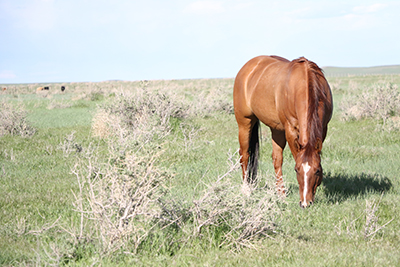Horse health: Keep traveling horses safe with a CVI

As events start to open up across the country, animals will be traveling to different events. As horses move across state lines – and even within – it is important to take the proper safety measures to protect other horses.
“Heath Certificates, or Certification of Veterinarian Inspection (CVI), proves a veterinarian has looked at an animal and deemed it free of infectious diseases. This is needed for travel with animals,” explains Dr. Nathan Glaza, host of the Veterinary Podcast and owner of Licking Valley Veterinary Service.
Certification of Veterinarian Inspections help protect infectious diseases from spreading.
Glaza explains, “The government deems we as veterinarians should give our stamp of approval horses won’t transmit diseases.”
Certificate details
There are many pieces making up the heath certificate. First, the paper will indicate whether the horse is traveling intrastate or interstate.
Intrastate regulations are specific to horses traveling within the state and can be obtained by local veterinarians.
On the other hand, interstate health certificates are valid for 30 days. It is important the veterinarian clarifies which states the horse will travel through on the certificate. It is also important to understand how laws may vary between states.
Next, the health certificate provides the intended purpose of the horse. The purposes can vary from show, rodeo, race, trail ride, sale or other.
Then, horse owners need to indicate how the animal will be transported. While the most common means of transportation is truck, there are many other ways this can be done.
After transportation, the health certificate asks for the basic horse information. The owner or consigner of the horse needs to be established on the CVI. This also needs to include the physical address of the horse.
“This is important in tracking the horse in the case of an outbreak of disease,” says Glaza.
Additionally, the owner’s address and information is included, along with the addresses of where the horse will be traveling. On this point, Glaza stressed the important of including full addresses on all health certificates.
Also found on a typical health paper is a section for comments and permit number. The comment section allows the veterinarian to fill specific details on the horse. “Permit number is where the vet contacts the state, in essence to notify the state animals are coming and receive permission in the form of a number that the animals can come to the state,” mentions Glaza.
Finally, horse information is added to the paper. This includes horse tattoo or other means of identification, name, breed, color, age, sex and temperature at time of exam. This section also requires negative Equine Infectious Anemia (EIA) or Coggins test information. This test is required for travel and receiving health certificates.
Wyoming concerns
For Wyoming horse owners, health certificates help keep the state’s horse population safe. There are many diseases that can be prevented by obtaining health certificates. state veterinary officials are diligent when it comes to writing a CVI and it is proven in the herds of healthy horses across the state.
“There have not been any positive cases of EIA in the state for many years,” reflects Dr. Brad DeGroot, Wyoming assistant state veterinarian, on Wyoming horse health.
Paroplasmosis is very similar to EIA. This blood born disease has been a concern in Quarter Horses. However, by testing for paroplasmois and Coggins before buying a new ranch horse the buyer and seller can help ensure safety.
For the upcoming summer, DeGroot is also concerned about West Nile virus, which can affect both horses and people.
“It’s more of a problem at lower elevations,” said DeGroot. “It is a mosquito-borne disease which can spill over into people.”
Equine influenza and equine herpies were also mentioned by DeGroot – both can be serious infections. Wyoming horse owners need to be cautious of these diseases to protect horses across the state.
By obtaining a CVI, horse owners can help keep the whole horse population healthy.
Glaza summarizes their importance, noting, “Health certificates are not for individual horses in a grand sense, they are to protect our state horse herd or our nation’s horse herd.”
Savannah Peterson is an intern for the Wyoming Livestock Roundup. Send comments on this article to roundup@wylr.net.





